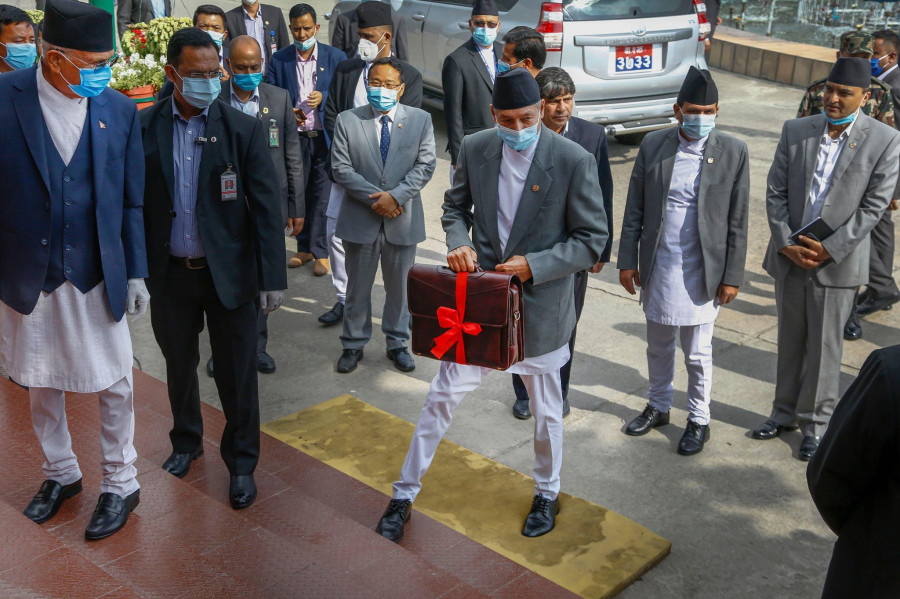Climate & Environment
Budget failed to address environmental concerns and new challenges, environmentalists say
While the government has increased tax on electric vehicles, backtracking on its past commitments, it has also paid little attention to the link between public health and environment.
Chandan Kumar Mandal
In what many are describing as one step forward and two steps back, Finance Minister Yubaraj Khatiwada on Thursday failed to address the burning environmental concerns in his budget speech for the fiscal year 2020-21.
According to environmentalists, the government could have utilised the budget by coming up with innovative programmes for environmental protection, increasing the budget for the sector and using the pandemic for protecting nature and environment.
Khatiwada not only included the same mundane programmes but also reversed on some earlier commitments.
“The government is not even sticking to its earlier commitments, let alone prioritise the environment sector despite growing calls,” said Bhushan Tuladhar, an environmentalist. “Most of the programmes mentioned in the budget are a mere continuation of the past ones. The budget could have been a transformative one.”
What has riled many is the government decision to impose a massive tax on electric vehicles. The government has increased both the customs and excise taxes on electric vehicles up to 80 percent, depending upon the capacity of e-vehicles.
Earlier, the government had been charging only 10 percent customs duty, 13 percent VAT and 5 percent road tax on EVs.
EV promoters say this will stop the momentum of the increasing popularity of green vehicles in the country.
“Amidst Covid-19 concerns, people will be reluctant to use public transport. The public might have opted for e-vehicles” said Tuladhar. “But they will now be discouraged, as the prices have almost doubled.”
Khatiwada, however, defended the decision to revise taxes on e-vehicles, saying it was taken based on the experience of the past few years.
“Even when there was almost no tax, e-vehicles entered the country in the nominal numbers only. Expensive EVs were the only ones seen on the roads,” Khatiwada said during an interaction with journalists. “Electric vehicles used by the general public are still subsidised. The existing subsidy would only benefit a certain section of people.”
According to Khatiwada, there was no point in continuing the subsidy, as the country’s import of petroleum products still went up in the last few years while it lost revenues by giving tax discounts on such expensive e-vehicles.
“But despite the hike in the customs duty, tax on EVs is still on the lower side compared to diesel and petrol vehicles,” said Khatiwada. “The tax has been hiked for expensive vehicles only. If ordinary people want to buy EVs that are cheaper, they won’t be burdened with high taxes.”
Since the government imposed a lockdown starting March 24, vehicles have remained off roads in the past two months. Many have marvelled at the drastic reduction in pollution levels, especially in Kathmandu Valley. Environmentalists say the lockdown has shown that Kathmandu’s air is polluted largely because of a large number of vehicles burning dirty fuel, and that cutting down on fossil fuel and promoting electric vehicles are the best ways to improve air quality.
According to Tuladhar, the government deciding to increase such taxes contradicts its commitments to promoting e-vehicles in the country to ensure that the public gets to breathe clean air.
“During the budget speech, the finance minister said EVs would be promoted. But the annex part shows taxes would be increased,” said Tuladhar.
A hike in duty in e-vehicles, however, is not the only point environmentalists have been raising, as they say the government has completely failed to pay heed to other environmental concerns.
The government has allocated Rs14.5 billion for the Ministry of Forest and Environment in this year’s budget. Forest and environment-related programmes look almost similar to those in previous years.
According to Prabhu Budhathoki, former country representative for IUCN Nepal and former National Planning Commission member, the government seems to be completely oblivious to the present situation and that is reflected in its budget.
“It looks like the government has blindfolded itself and plugged its ears. It seems to be groping in the dark,” Budhathoki told the Post.
While many have hailed the government for increasing the budget for the health sector to Rs 90.69 billion in the wake of the Covid-19 pandemic, others have taken issue with the government failing to pay heed to other pressing sectors.
“Environment is one such sector that has failed to get its due focus,” said Budhathoki.
Environmentalists say just as the pandemic has necessitated more investment in health, the government should also have paid attention to how clean air and water are people’s fundamental rights and how a better environment can ensure their wellbeing. But the government has failed to recognise the connection between the global pandemic of Covid-19, the environment and the public health, and to act accordingly.
According to Raju Acharya, a Pokhara-based wildlife conservationist, the environment sector should have been the priority in this year’s budget.
“But the environmental programmes lacked novelty, hence it’s discouraging from the conservation point of view,” said Acharya, who is also the executive director of Friend of Nature Nepal, a youth-led non-governmental organisation working in the field of environment and wildlife conservation. “It looks like there was hardly any discussion for the environmental sector before programmes were included in the budget.”
According to Acharya, the government could have specifically allocated budget for research areas, especially in studying the impact of Covid-19 in the conservation sector and protected areas, as the pandemic which started from China is directly linked to wildlife.
The government has even reduced the budget for the Ministry of Forest and Environment, the main body responsible for environmental protection and conservation, exposing its lack of commitment towards environment, according to conservationists.
“We should understand that there is no going back to normal, even in the post-Covid-19 world. If we go back to normal, we will have the same recurring problems,” said Budhathoki. “We have to march towards a different economy altogether—green economy—which is both sustainable and friendly to the environment and the public. Rather than making strides forward, the government reduced the budget for the environment sector, making it look directionless and a complete mess.”
In 2018-19, the Forest Ministry’s resource share was 1.26 percent of the total budget, which went down to 1.01 percent in the current fiscal year. The budget for the fiscal year 2020-21 has now dropped to 0.99 percent of the total Rs 1.47 trillion.
Tuladhar said an increased budget for health and employment is quite understandable. “We definitely need more healthcare facilities. But we cannot forget the environment,” said Tuladhar. “Studies have shown that there is a link between air pollution and Covid-19 death rates. We cannot ensure public health without talking about environmental health. However, it seems the government has failed to consider it a priority.”



 9.7°C Kathmandu
9.7°C Kathmandu










